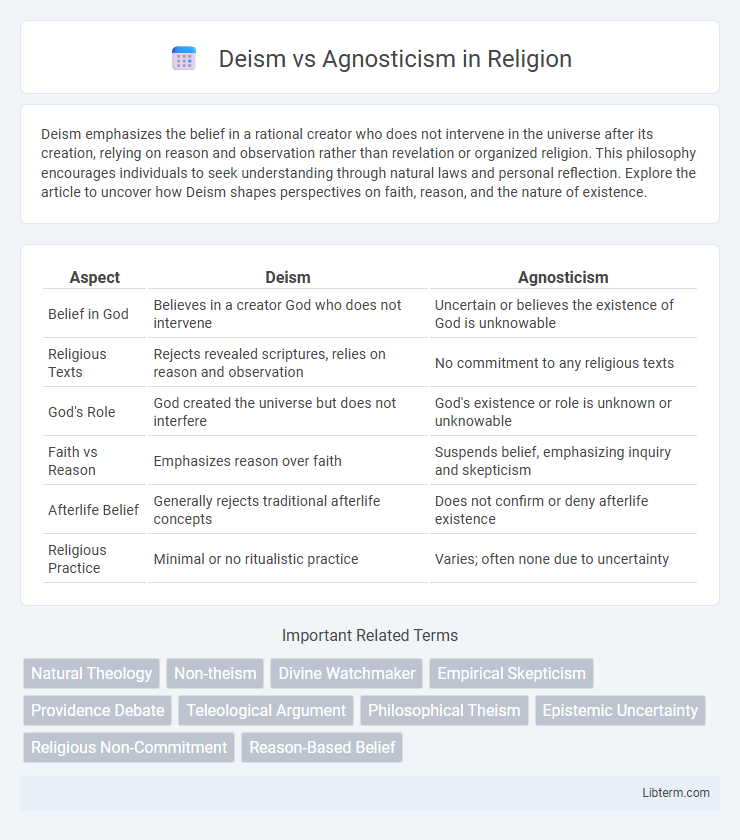Deism emphasizes the belief in a rational creator who does not intervene in the universe after its creation, relying on reason and observation rather than revelation or organized religion. This philosophy encourages individuals to seek understanding through natural laws and personal reflection. Explore the article to uncover how Deism shapes perspectives on faith, reason, and the nature of existence.
Table of Comparison
| Aspect | Deism | Agnosticism |
|---|---|---|
| Belief in God | Believes in a creator God who does not intervene | Uncertain or believes the existence of God is unknowable |
| Religious Texts | Rejects revealed scriptures, relies on reason and observation | No commitment to any religious texts |
| God's Role | God created the universe but does not interfere | God's existence or role is unknown or unknowable |
| Faith vs Reason | Emphasizes reason over faith | Suspends belief, emphasizing inquiry and skepticism |
| Afterlife Belief | Generally rejects traditional afterlife concepts | Does not confirm or deny afterlife existence |
| Religious Practice | Minimal or no ritualistic practice | Varies; often none due to uncertainty |
Understanding Deism: Core Beliefs and Origins
Deism centers on the belief in a rational Creator who designed the universe but does not intervene in its operation, emphasizing reason and observation over revelation or dogma. Originating during the Enlightenment, Deism rejects organized religion's supernatural claims, advocating a natural theology based on innate human understanding and scientific inquiry. Core beliefs include the existence of a Creator discernible through nature, the rejection of miracles, and moral principles derived from reason rather than scripture.
Defining Agnosticism: Principles and Perspectives
Agnosticism centers on the principle that the existence or nonexistence of deities is inherently unknowable or currently unknown due to insufficient evidence. Unlike Deism, which asserts a rational belief in a creator based on reason and observation of the natural world, Agnosticism maintains a position of skepticism and open inquiry without committing to a definitive stance. This perspective emphasizes intellectual humility and critical thinking, prioritizing empirical evidence over doctrinal certainty.
Key Philosophical Differences Between Deism and Agnosticism
Deism asserts the existence of a rational creator who designed the universe but does not intervene in its workings, emphasizing reason and observation over revelation. Agnosticism maintains that the existence or nonexistence of deities is unknown or unknowable, prioritizing skepticism and withholding belief due to insufficient evidence. The key philosophical difference lies in Deism's assertion of a known, non-interventionist deity versus Agnosticism's neutral stance on the divine's existence pending conclusive proof.
Historical Development of Deism and Agnosticism
Deism emerged during the 17th and 18th centuries Enlightenment as a rationalist belief system rejecting organized religion and divine revelation, emphasizing reason and observation of the natural world to deduce God's existence. Agnosticism, coined by Thomas Henry Huxley in the 19th century, developed as a response to the limitations of human knowledge about the divine, maintaining that the existence of God is unknown or unknowable. Both philosophies shaped modern religious skepticism by challenging orthodox dogma and influencing secular and scientific thought.
Major Thinkers: Influential Deists and Agnostics
Major Deist thinkers include Thomas Paine, whose work "The Age of Reason" championed reason and natural religion, and Voltaire, who advocated for religious tolerance and criticized organized religion. Influential Agnostic figures feature Thomas H. Huxley, who coined the term 'agnosticism' and emphasized empirical inquiry, and Bertrand Russell, who argued for skepticism regarding metaphysical claims and religious dogma. These thinkers shaped the discourse on belief, reason, and the limits of human knowledge within their respective philosophical frameworks.
Approach to God and Divinity in Deism vs Agnosticism
Deism asserts the existence of a creator who designed the universe but does not intervene in human affairs, emphasizing reason and observation as the means to understand God. Agnosticism maintains a position of uncertainty regarding God's existence, highlighting the limits of human knowledge and refraining from definitive claims about divinity. While Deism affirms a non-interventionist creator accessible through natural law, Agnosticism prioritizes skepticism and the acknowledgment of unknowability in the divine realm.
Perspective on Religion and Organized Faith
Deism emphasizes belief in a rational Creator based on observable nature, rejecting organized religion and divine revelations, while agnosticism maintains skepticism about the existence of any deity, often questioning religious claims without committing to a belief system. Deists typically view religion as a human-constructed institution that distorts pure natural religion, whereas agnostics tend to withhold judgment, focusing on the limits of human knowledge regarding spiritual matters. This contrast highlights deism's confidence in reason and natural theology compared to agnosticism's insistence on intellectual humility and empirical evidence.
Impact on Science and Rational Inquiry
Deism, grounded in the belief in a detached creator who does not interfere with the universe, encourages the pursuit of scientific knowledge by emphasizing reason and observable evidence. Agnosticism maintains a position of uncertainty regarding the existence of deities, fostering an open-minded approach that champions inquiry and skepticism without committing to definitive metaphysical claims. Both perspectives have contributed to the advancement of science by promoting critical thinking and reliance on empirical data rather than dogma.
Societal Influence and Modern Relevance
Deism has historically shaped Enlightenment thinking by promoting reason and natural law, influencing modern secular ethics and constitutional frameworks. Agnosticism fosters open inquiry and skepticism, encouraging intellectual humility and scientific exploration within contemporary society. Both perspectives contribute to ongoing debates about faith, knowledge, and the role of religion in public life, underscoring their significance in cultural and philosophical discourse.
Choosing Between Deism and Agnosticism: Personal Reflections
Choosing between Deism and Agnosticism involves evaluating beliefs about divine existence and knowledge. Deism asserts a rational belief in a non-interventionist creator based on reason and observation, while Agnosticism emphasizes the uncertainty and lack of conclusive evidence regarding any deity. Personal reflections often center on reconciling the desire for spiritual meaning with intellectual honesty about the limits of human understanding.
Deism Infographic

 libterm.com
libterm.com